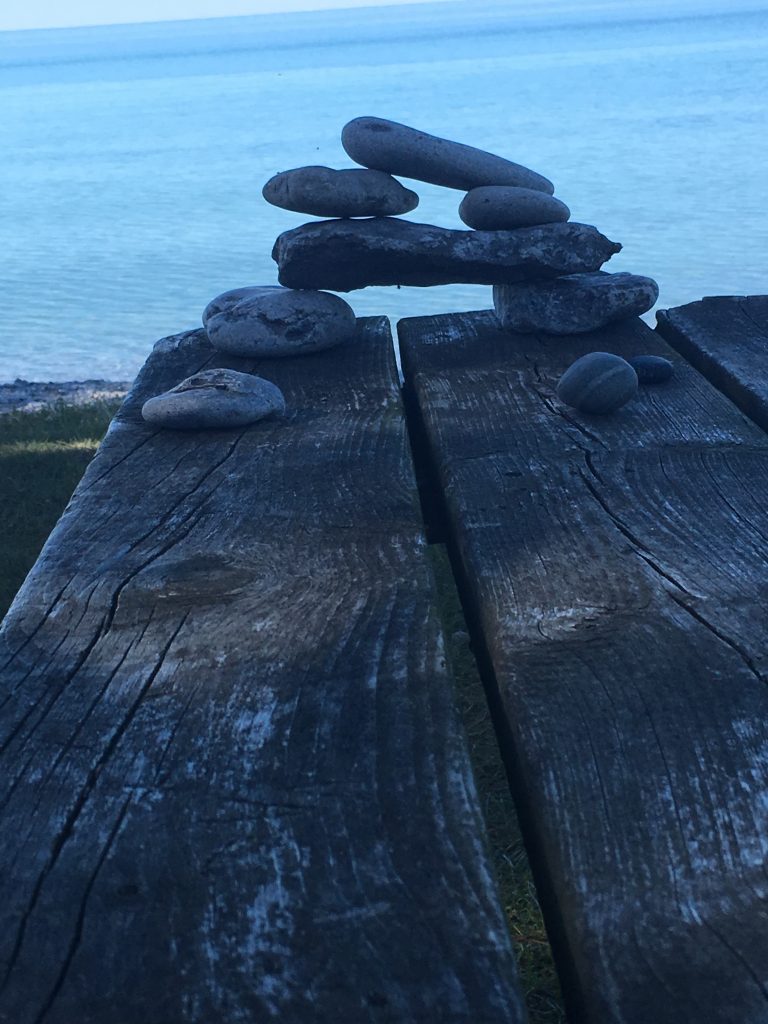As mentioned in “Understanding Homeschooling,” many people are now at least familiar with the homeschooling term but still don’t have a full understanding of it. They might have even less so of unschooling.
What is unschooling anyway?
Well, different people see unschooling as different things but I think the most common way of thinking of it in our current times involves respecting children’s right to own and determine their learning, with available guidance, support and wisdom from parents and others. It’s often listed as a particular form or style of homeschooling, although others think of it as a process or lifestyle in and of itself. Life learning/unschooling isn’t limited to children. It’s something we do from infancy to death. As we live, we learn. As we’re interested in something, we pursue it and learn more about it as we go. As we need something, we figure it out.
Just as I have mixed feelings about the term “homeschooling,” I prefer the term “life learning” to “unschooling.” The prefix “un” gives the impression of not doing something and kids are doing so much! Also, if they are kids that haven’t been to school, then there’s not much “unschooling” to do. However, I respect people’s use of it and it’s the most popular term used in discussion so I’ll roll with it here. It might be growing on me.
Parents almost always work through something known as deschooling.
“Deschooling” has come to be known as a process of moving beyond the idea of learning being attached to subjects, grades, rules, etc. and instead recognizing that it is a natural, inevitable part of life. Sometimes this happens bit by bit as they begin to see the deep learning that their kids are doing. Other times they quite consciously decide to try a period of deschooling. Although the idea of deschooling is for kids as well, particularly when they’re coming out of the school system, parents actually often have a longer process and may not ever be fully finished!
Natural learning isn’t neatly divided into categories and subjects. Something as simple as a child wanting a new basketball net can turn into online research about which brands the stores have, research and ratings of the different brands, thinking through pricing and tax, checking a bank account online, realizing there’s not quite enough there but remembering (with relief) the British pounds on the dresser that were a birthday present from their aunt that haven’t been deposited yet (yes, this is an example of natural, self-directed learning from our family). That leads to looking up the currency conversion to figure out how that works in Canadian dollars, going to the bank teller to deposit and then withdraw and then off to the store that they have decided had the best rated brand for the best deal. It is also learning that a high quality brand for a slightly higher price might actually be a better deal depending on how you’re looking at it. Then, back home to carefully read instructions and begin assembly.
There are a number of skills at play here, involving lots of practical reading and math, research, critical thinking, mechanics and of course physical activity from using the basketball net. Those seem like the most obvious. If we delve a bit deeper, though, we might realize the physics that are almost unknowingly involved in both setting up the net and in dribbling and shooting hoops. What might be even more important than those individual skills though? The ability to set up a practical plan and execute it. The determination to go through the necessary steps from idea to final assembly as well as the combination of independence and respectful collaboration with a parent around organizing the pick up of the basketball net from the store. That’s the stuff of life…
We can get so busy thinking of all the individual subjects and pieces that we lose sight that the reason for learning them is to be able to integrate them into these kinds of full life processes.

So, unschooling is a sort of flipping the traditional school idea around on its head; rather than learning information/covering subject matter ahead of time for when / in case a child uses it, they learn it AS they need or want to use it. The learning is not “in case” or “someday” learning but learning in direct context and so it is actually learned and stored on a deeper level.
Yes, unschooling works. It works as much as any other way of learning and many would argue that it works better than most because kids are motivated and self- directed. The thing is that there isn’t a standard measurement or common outcome and that is a tough thing to wrap our heads around in our world that has increasingly standardized learning. It’s not always quantitative (although it certainly can be) so it’s so much harder to describe and explain.
Because it is so steeped in relationship and connection, unschooling makes it quite easy to see the learning and growth that’s happening in natural ways though. When deep conversations develop about a book or movie, tests aren’t necessary to determine comprehension. When stories are written or plays are written and acted out, it’s easy to see the development of writing skills. When kids delve into an interest about sharks or tigers, research skills become obvious and usually move at an incredibly fast pace.
There may be parts of learning that kids might not want to share. Pieces of art, writing, composed music or even ideas that they aren’t wanting to have shown, photographed and likely not evaluated or analyzed. These might even be their “best” pieces, but external evaluation might not the reason for their work. It’s a different depth of working – intrinsically motivated rather than put together for marks.
Often the qualities that develop are not concrete or measurable. To touch back on this a bit further, things such as maturity in relationships, a deeply held sense of self (those two go together by the way!), confidence to learn new things, keen ability to manage time, money and energy, strong interpersonal skills, creativity, critical thinking skills, sense of adventure and exploration, priority of family, healthy respect of friends, sense of community, competent practical skills, ability to be in one’s own company without constant structuring of activity and social life, maturity of faith and life views, sense of wonder and JOY are not specific achievements. There is no score or grade, award or trophy. They are “felt” things … qualities, characteristics. They are actually the very things that might just be the most important to live a healthy, happy, giving life.

Unschooling leads to the development of things other than “soft skills.” When kids are ready to do things like read, compute, learn about the world, understand business or economics, science or any number of other things, they often dive in with a vengeance. Many adults who grew up unschooling have gone on to very successful post-secondary study in a range of fields and others have chosen to continue to self-direct their learning into other occupations. The definition of success is very individual!
There is organization involved in unschooling. It just looks different for each family. Rather than post a daily schedule or agenda, parents might have fairly frequent times that they talk about the goals and ideas that everyone has. Kids might set goals for the year in a concrete way or they might set them at the beginning of a week or month. Some families might have a more casual way of talking about what everyone’s up to rather than a certain time frame. Setting goals is not all about kids. The family can think about things they’d like to do individually or collectively and work out when and how.
It is possible to keep necessary homeschool records and still learn naturally. Depending on where people live, if parents are needing to keep track of specifics to record for homeschool records, it can work well to write them down to at the end of the day as a record of what happened during the day. If that isn’t detailed enough, the various activities of the day can be translated and organized into various subjects. There is some irony in working through the process of deschooling only to have to reconstruct natural learning into subjects though!
Unschooling involves an active relationship between parents and child and among family members in general. It is not lazy parenting. It’s not sitting around while kids break things or are rude and hurtful. That is actually what has come to be known as “unparenting.” Unschooling parents are engaged, tuned in, resourceful and spend lots of time with their kids, modelling, discussing and working things through.
However ( there’s always a “but” isn’t there?), it’s also not “overparenting,” meaning that kids have lots of space to learn and grow and make mistakes.
Unschooling is not necessarily child-led. Parents and other adults have a significant role in introducing ideas and sharing wisdom as well. It often flows much more smoothly when everyone is involved in setting goals, talking about what’s important to them and thinking through ideas.

The practical reality is that parents have a natural place of leadership because they are older, more experienced and hold responsibility for money and property and family life. The strengths that kids bring are things such as new ways of thinking and an understanding and experience of themselves. They know their interests, passions, preferences and how their senses process things. Of course there are things parents are aware of that kids might not foresee, so parents are involved and offer guidance. They mentor, talk things through and put limits in as necessary. This is not “the kids can do whatever they want, regardless of how it affects others.” It’s about conversation, compromise, having respect for what works for others, including them. There are natural limits in life … amounts of money, time, weather, needs of others are things that we all have to navigate. Nobody in life can do whatever they want but it’s helpful when limits make sense and can be discussed.
That being said, when kids are told what to do most of the time … mandated school structure all day, followed by more structured activities and then authoritative parenting, they have less practice developing self-discipline, little time to mature naturally, minimal experience with really knowing themselves.
Kids (and all people!) can and do commit to hard, complex work without being forced. There is concern that without pressure and orders, kids won’t, but most families find that when kids have a need or interest, they often become extremely focused. When kids know and trust they have ample time and space to pursue their own learning, they experiment and often really commit to working on things – like really commit. They research, test it out, sometimes relentlessly, take a test and often come back at it even stronger and more competent.
Families draw from a variety of resources, sometimes including workbooks and/or curriculum. Many have a range of resources on hand and help find books or courses as the need or interest arises. Kids of all ages sometimes request a program or course of study. Sometimes it’s quite formal as in lessons or classes. Sometimes it’s more informal such as non-fiction books or workbooks to work through. As kids get into the teen years, it’s quite common for them to pursue either a a talent or passion more formally OR to move in a general direction of more concrete learning/courses/credits that can be directed toward a specific goal.
Kids who have grown up unschooling are essentially able to choose the same post-secondary routes as anyone else. With the exception of one university I know of, post-secondary institutions are very commonly open to admitting students who have been home educated. In the case of unschooling, it’s sometimes a matter of deciding what you’d like to do and “working backward” from there by choosing to take the necessary prerequisites or equivalent courses for that particular program. Portfolios are another common option that work well for certain fields of learning.
Kids often choose to begin paid work, apprenticeship or post-secondary study earlier or later than their “year.” They might begin a dual-enrolment path with a college or have the opportunity to begin an apprenticeship early. On the other hand, they, like many people regardless of how they have been educated, might apply to a post-secondary institution as a mature student after taking a year or more to work or travel.
Yes, unschooling does leave gaps in learning. It absolutely does but there are gaps in all of our learning, both in knowledge and skills, no matter where we are educated. There are actually many things that are left out of school curriculum that lots of unschooling families spend time doing. There is no way to learn everything in the world. What families have noticed is that the knowledge and skills that society considers important or “core” skills are naturally experienced or sought out by kids as they become necessary or important or often if they see others engaged. On the other hand, there are many things that unschooling kids know and are stronger at than other kids. We all have gaps. We could think of a gap as an opportunity to learn something we haven’t learned yet rather than something to be afraid of.
Growing up in a house where lots of reading is happening (both aloud and people reading themselves), kids are naturally exposed to the sound, sight and meaning of words and the curiosity of what people are looking at when they are reading something to themselves. Once kids become ready to read themselves, they often work really hard at it and progress quite quickly.
Having lots of time outside in a variety of ways almost inevitably leads to understanding and exploration of plants, animals, water, weather, sky, clouds, astronomy…..
Socialization can happen quite easily in an unschooling lifestyle. As with home education of any kind, there can be all kinds of opportunities to meet people, interact in different ways and develop friendships. Some of these might be in specific home education groups and others might be in everything from sports, music, Scouts and church to neighbourhood connections. Kids can meet others who share their interests and passions and connect around that interest, with age not really being a factor.
It is really for everybody! Adults and kids both learn and all adults actually unschool (or as I prefer to say, “life- learn”) most of the time. If you go to the library to choose a book, research things on the internet, decide to learn to knit, take up a new sport or decide to pursue formal courses of your choice, you are naturally learning / life learning / unschooling – however you want to put it – whatever age you are. It’s the way we learn before we go to school and the way we learn all the years of our lives following:).

Enjoy this post? Please share.


Erin, this is a wonderful description of unschooling. Love how you describe it as ‘steeped in relationship and connection’, and recognise the importance of ‘conversation, compromise, having respect for what works for others, including them’. Beautiful x
That impression of not doing much, kids and parents… how far from the reality of our daily lives is that 🙂 Love how following this natural learning/life learning/unschooling gorgeous life with my children has revealed so many ‘gaps’ in my own knowledge and experience and gifted me the opportunity to learn right alongside them.
Oh, thank you, Hayley! Revealed so many ‘gaps’ in knowledge – oh my goodness, yes! I don’t think I had any idea how much there was in the world to learn and explore. It’s been really neat to be introduced to so many ideas and interests that I might never have discovered:).